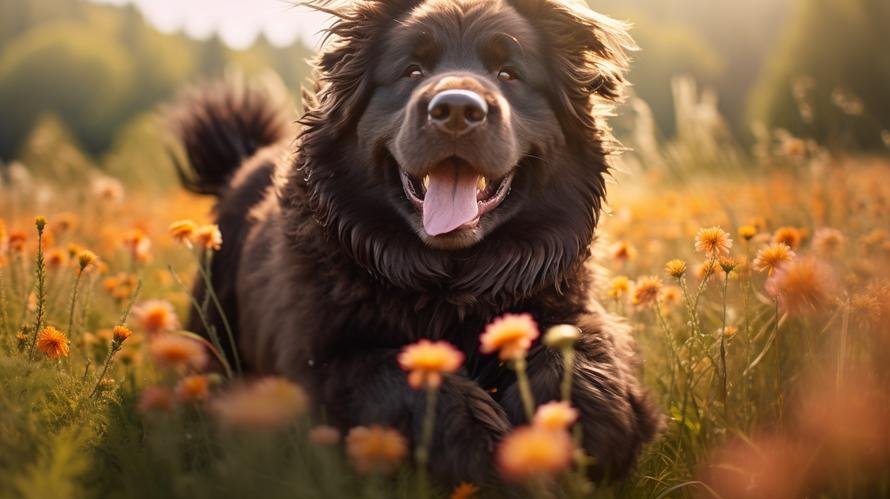There’s a breed of dogs so awe-inspiringly massive they make human adults appear almost child-like in comparison. Forest-like fur brushes against your legs as these incredible canines saunter by, their eyes reflecting a deep reservoir of intelligence and mellow wisdom. Meet the Newfoundland dog, named after the place of its origin, the Canadian province of Newfoundland and Labrador.
However, their impressive size often begs an unsettling question to prospective pet owners – ‘is a Newfoundland dog a dangerous dog?’. In this engaging read, we’ll take a calm, friendly saunter into the world of the gentle-giant Newfoundland dogs to uncover the truth once and for all.
The Newfoundland dog is anything but a vicious monster. In fact, these majestic canines are often hailed as ‘Gentle Giants’ and ‘Nanny Dogs’. They boast a sterling reputation and a multitude of stories to back up their unswerving loyalty, heart-melting gentleness, and great love for their human companions and families. The Newfoundland has hung around humans for so long, they’ve woven themselves into folk tales and legends.
Enhancing this dog’s legacy, is a Newfoundland dog named Seaman, who was part of the famous Lewis and Clark Expedition as a personal companion to Captain Meriwether Lewis himself. Seaman even managed to save the life of his human companions from an angry herd of buffalo and once got bitten by a beaver when looking out for the safety of the crew. The tales of Seaman’s abiding loyalty, courage, and gentleness reflect the true heart of a Newfoundland dog.
Where does this breed come from, you ask? Well, it’s believed that the Newfoundland dog can be traced back to the Tibetan Mastiff. They were bred by fishermen in Newfoundland for their strength and water-resistance, which made them perfectly suited for heavy labor such as pulling in fishing nets. They could even perform rescues in water thanks to their webbed paws! This inherent heroism has persisted till today, making them one of the most favored water rescue dogs, proving the Newfoundland to be a protector, not a threat.
Speaking of size, it’s true that Newfoundland dogs turn heads with their colossal structure. Males can easily weigh around 130-150 pounds and females around 100-120 pounds. But don’t let their size fool you. These dogs are notorious for their gentle, pacifying nature. They’re exceptionally good with children, which is why they earned the nickname ‘Nanny Dogs’. Kids can ride on these dogs’ backs, play roughly with them, yet all they are likely to get in return is affectionate slobbering and the occasional tired sigh.
However, just like any other breed, a Newfoundland’s behavior largely depends on training and socialization. Newfoundland dogs are intelligent and learn quickly. An occasional firm hand during their inquisitive puppyhood days can shape them into the ideal pet.
In matters of aggression, it’s rare to find a Newfoundland with an aggressive streak because they’re essentially sweet-natured. If they do become aggressive, usually it might be because the dog is afraid or feels threatened. Therefore, it’s crucial to expose Newfoundland puppies to a variety of situations, people, and other pets to cultivate confidence and discourage aggression.
There’s only one warning; these dogs are massive droolers. They leave trails of saliva wherever they go and aren’t ideal for people who like immaculate homes. On the health front, due to their size, they are prone to certain conditions like hip dysplasia, heart issues, and a shorter lifespan of 8-10 years.
So, to answer the question, ‘is a Newfoundland dog a dangerous dog?’ A resounding ‘no’ echoes. These dogs are rather imposing in size and might give an impression of danger, but underneath those layers of fur and muscles is, quite frankly, a big, warm, soggy, lovable baby.
However, like with any other breeds, ownership of a Newfoundland requires love, commitment, time for play, exercising, grooming, and a spacious drool-proof space.
Rest assured, Newfoundlands tend to return your loving investment tenfold, not in money, but in tail wags, sloppy kisses, and unyielding devotion. So, if you have a large enough heart and home, then there’s no better companion than the mighty, yet incredibly gentle Newfoundland dog.



